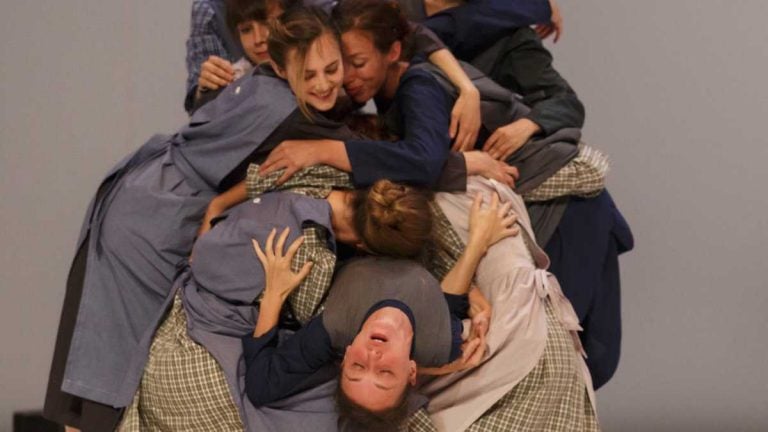Fringe Festival review: ‘The Four Seasons Restaurant’

The cast of 'The Four Seasons Restaurant' at the Philly Fringe Festival, either birthing a character or sending her to the afterlife. (Photo courtesy of Christophe Raynoud de Lage)
The extraordinary, brazenly abstract “The Four Seasons Restaurant,” which FringeArts has brought to this year’s festival, is an event and an experience as much as it is a performance. The 10 women of the Socìetas Raffaelo Sanzio troupe, led by the theater artist Romeo Castellucci, create a 90-minute theatrical treatise on absence – a wildly unusual piece that also explores desire, need and loss.
Some people will call it provoking, some might say it’s disturbing. And some will surely think “The Four Seasons Restaurant” is plodding – it’s full of deliberate and deliberately slo-mo moments, In fact, it’s a show of beautifully rendered movement theater and dynamic multi-media displays.
The show’s title is a reference to artist Mark Rothko’s famous refusal to allow his work to hang in New York’s Four Season’s restaurant, a commission he found tantalizing but a place he determined was vulgar. His decision meant an absence; the walls of the restaurant would not be adorned by him. The show itself never references the incident.
It begins with a visual display explaining a black hole found by NASA, set against a sound design of a scientist’s recording that allows us to hear what, in real life and without the help of sonar technology, we could never hear: the noise of a solar wind and masses of gas explosions at the edge of the black hole, 250 million light years away. (We wear earplugs handed to us on entry to the performance space, in the 23d Street Armory.) The noise is a thunder of vibration that we hear and feel. The black hole leaves nothing in its wake – it’s a creator, as well as a symbol, of absence.
I won’t tell you the chapter and verse of this piece – if you see it, you have the same right to feel it out as I did. But in general, women who cannot speak because they’ve mutilated themselves take to the stage to offer a tale called “The Death of Empedocles,” a story-poem in classical Greek style but, in fact, by an 18th-century German poet named Friedrich Hölderlin. The character Empedocles kills himself trying to join with lasting nature, and is despised by politicians and leaders for his action, which they see as hubris and greed. Because they cannot speak, the women acting out this story mouth the lines (in Greek, with English translations projected) to an increasingly fuzzy recording.
The show then morphs into a visual and aural – and immensely sensate — display of what that black hole of absence, the same one that ate Empedocles and eventually marks the end of all things, looks like. It’d a feat of stage design and showmanship, done almost wholly with electronics and the simple movement of curtains.
If you see the show, prepare to let it rest a while in your thoughts. I did, and got a lot out of it, pondering the everlasting destruction and depth of a black hole, and how that (and absence) fits into our idea of a physical world. “The Four Seasons Restaurant” offers something profound, but only if you let it swallow you into its own galaxy.
“The Four Seasons Restaurant,” from Italy’s Socìetas Raffaello Sanzio, is presented by FringeArts through Saturday (Sept. 13) at the Armory, 23d Street between Market and Chestnut Streets.
Philly Fringe Festival runs through Sept. 21.
WHYY is your source for fact-based, in-depth journalism and information. As a nonprofit organization, we rely on financial support from readers like you. Please give today.




